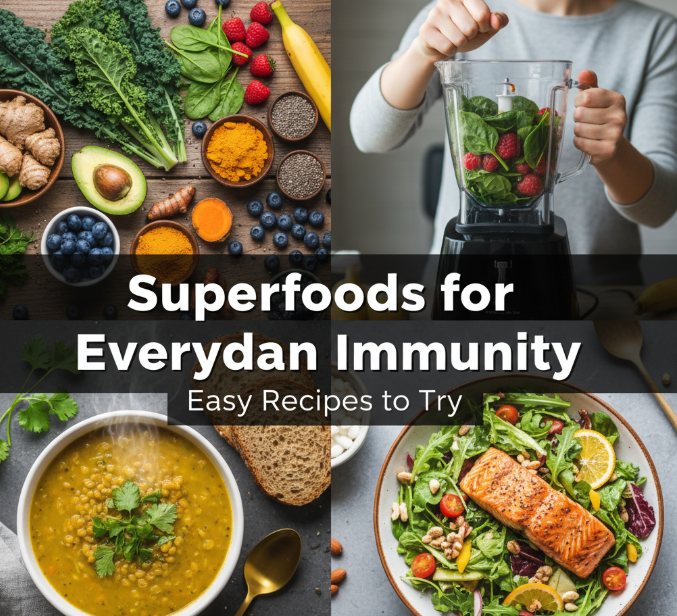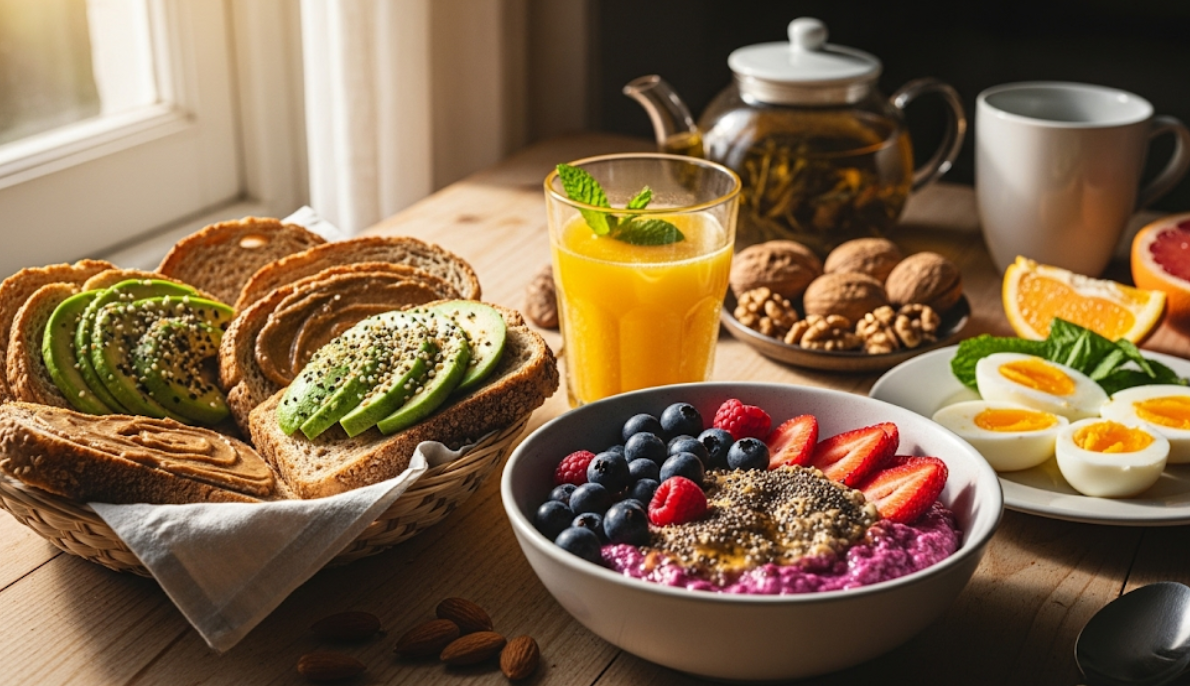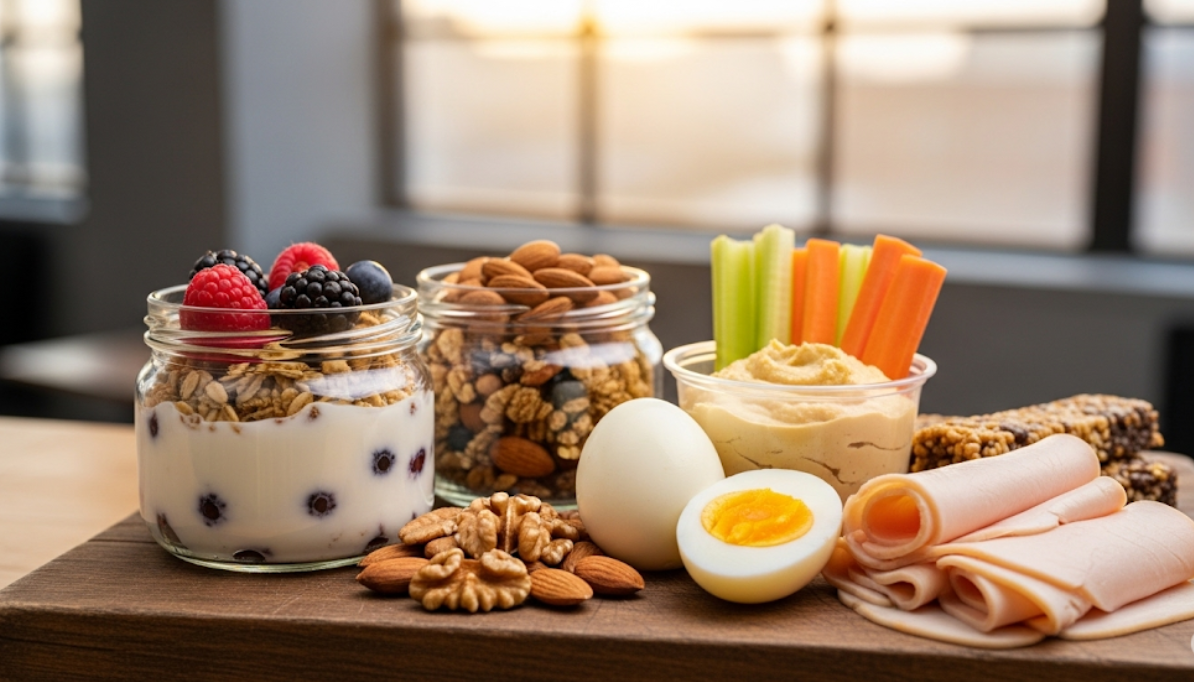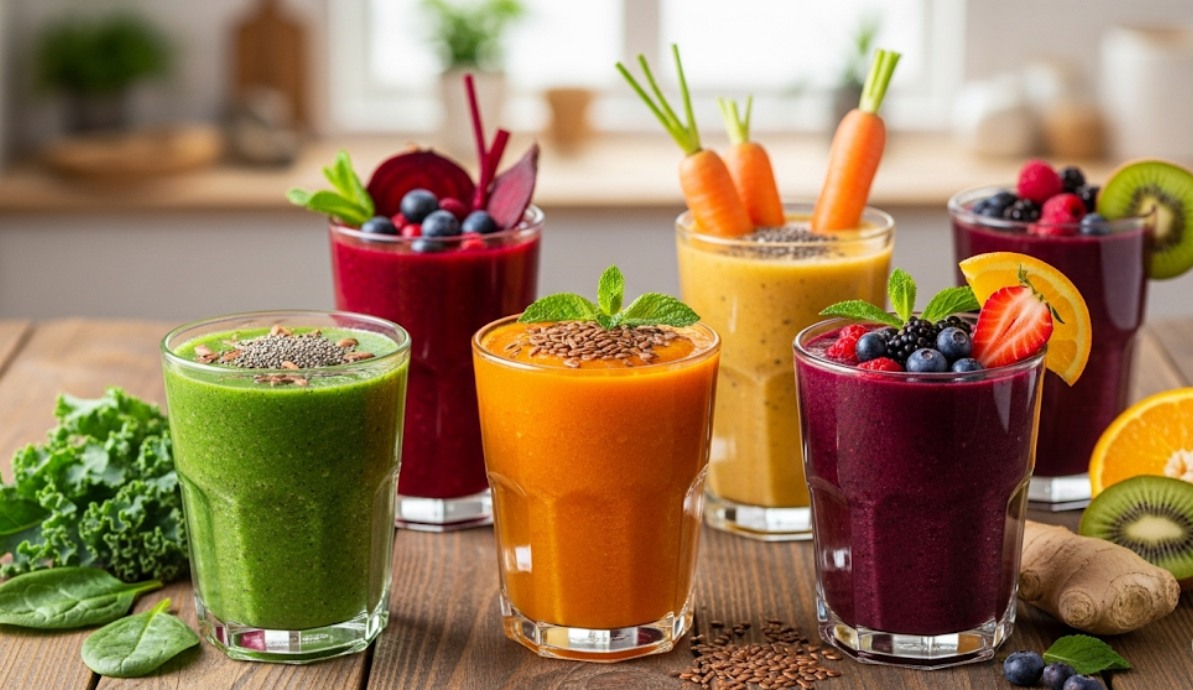Your immune system is working 24/7 to protect you. Consider it your body’s own security team, fending off germs, viruses and bacteria that would seek to make you sick. But like any team, your immune system needs the right fuel to carry out its best work. Which is where superfoods come in—highly potent, nutrient-dense elements that provide your body with the assets it needs to keep chugging along, strong and steady.
The best part? You don’t need costly supplements or intricate meal plans. And most immune-boosting superfoods are likely in your kitchen right now, so the recipes we’ll share aren’t complicated for anyone to make. Whether you’re a novice cook or kitchen master, these tasty dishes will give your immune system and energy a boost one meal at a time.
Why Your Immune System Needs the Right Foods
Before we get to the recipes, let’s talk about why food is such a huge deal for immunity. Your immune system is a collection of cells, tissues and organs that work together. These parts require certain vitamins, minerals and nutrients to function properly.
By consuming nutrients such as vitamins C, D and E, as well as zinc, selenium and antioxidants found in a variety of foods you’re giving your immune cells the ammunition they need to produce virus-killing proteins. Conversely, a diet hoarding processed foods and sugar can actually weaken your defenses, making it irresistible for you to fall ill.
The good news is, eating for immunity does not have to be miserable. Not only superfoods are good for you, they taste amazing when cooked a certain way!
Top Superfoods That Strengthen Your Immune Defense
Let’s take a look at the immunity game’s big hitters. These superfoods are not only high in nutrients, they are available in most grocery stores.
Citrus: Your Vitamin C Superstars
Oranges, grapefruits, lemons and limes are rich in vitamin C that helps your white blood cells fight infection. Your body does not store vitamin C, so you need to consume it regularly. One medium orange provides about 70 mg of vitamin C, nearly your whole day’s worth.
Garlic: Nature’s Antibiotic
Garlic has been used for medicinal purposes in civilizations dating at least as far back as the time of ancient Egyptians. It has allicin, a compound that can make immune cells more efficient at fighting off cold and flu. Research indicates that regular garlic eaters suffer colds less frequently than those who don’t eat it.
Ginger: The Anti-Inflammation Warrior
This zesty root is not only flavorful but also has anti-inflammatory properties that help your body combat infection. Ginger has gingerol in it, the antioxidant compound that aids immune function.
Spinach and Leafy Greens
Spinach is full of vitamin C, beta carotene and antioxidants. These nutrients multiply and send infection-fighting cells to work more effectively. The trick is not to overcook spinach — light cooking releases vitamin A while maintaining other nutrients.
Yogurt and Fermented Foods
About 70% of your immune system lives in your gut. Yogurt with live cultures, kefir, kimchi and sauerkraut help the good bacteria in your digestive system grow — reinforcing your body’s first line of defense against illness.
Berries: Antioxidant Powerhouses
Blueberries, strawberries and blackberries all contain anthocyanins which give them their deep coloring and provide some serious immune support. Berries combat molecules in our bodies known as free radicals that can do damage by damaging DNA and cells.
Turmeric: The Golden Healer
This vibrant yellow spice contains curcumin, which has powerful anti-inflammatory and antioxidant effects. Turmeric supports your immune system’s response by strengthening it when there is threat and soothing it before or after damage has occurred — without ever causing inflammation to get out of hand.
Almonds and Seeds
This crunchy snack contains vitamin E, which is a powerful antioxidant and key for immune function. A small handful of almonds provides about half your daily requirement of vitamin E.
Nutrient Breakdown: What Your Immune System Needs
| Nutrient | Why It Matters | Best Food Sources | Daily Target |
|---|---|---|---|
| Vitamin C | Helps white blood cells function | oranges, bell peppers, strawberries | 75-90 mg |
| Vitamin D | Regulates immune response | fatty fish, eggs, fortified milk | 600-800 IU |
| Vitamin E | Protects cell membranes | almonds, sunflower seeds, spinach | 15 mg |
| Zinc | Helps immune cells develop | oysters, beef, pumpkin seeds | 8-11 mg |
| Selenium | Fights oxidative stress | brazil nuts, tuna, brown rice | 55 mcg |
| Probiotics | Supports gut immunity | yogurt, kefir, fermented foods | 1-10 billion CFU |
Simple Recipes to Start Your Day Strong
Immunity-Boosting Berry Smoothie Bowl
This colorful breakfast takes only 5 minutes to put together and feels like dessert while charging your immune system.
Ingredients:
- 1 cup frozen mixed berries
- 1 banana
- ½ cup Greek yogurt
- ½ cup orange juice
- 1 tablespoon honey
- Toppings: sliced almonds, chia seeds, fresh or frozen berries
Instructions:
- Pulse the frozen berries, banana, yogurt and orange juice in a blender until smooth and creamy.
- Pour into a bowl
- Arrange toppings in colorful sections
- Enjoy immediately with a spoon
Why it works: This bowl is stocked with vitamin C (courtesy of berries and orange juice), probiotics from yogurt, and fiber, along with a dose of vitamin E found in almonds—all while tasting like dessert.
Turmeric and Ginger Oatmeal
This oatmeal recipe is comforting and warm, while still providing an abundance of health benefits and anti-inflammatory power – quickly making this your new favorite morning meal!
Ingredients:
- 1 cup rolled oats
- 2 cups almond milk
- 1 teaspoon grated fresh ginger
- ½ teaspoon turmeric powder
- 1 tablespoon maple syrup
- Black pepper (a pinch) – it helps in absorption of turmeric
- Toppings: walnuts, sliced banana, cinnamon
Instructions:
- In a pan, combine oats, almond milk, ginger and turmeric.
- Bring to a boil, lower to a simmer and continue cooking over medium heat for 5-7 minutes, stirring occasionally.
- Stir in the maple syrup and pepper
- Garnish with walnuts, banana and a little bit of cinnamon
Why it works: Turmeric and ginger are great known inflammation fighters, and oats offer the sort of fiber that feeds healthy gut bacteria.
Spinach and Garlic Scrambled Eggs
This protein-rich breakfast sustains your energy and immune function throughout the morning.
Ingredients:
- 3 eggs
- 1 cup fresh spinach, chopped
- 2 cloves garlic, minced
- 1 tablespoon olive oil
- Salt and pepper to taste
- Optional: crumbled feta cheese
Instructions:
- Heat the olive oil over medium heat in a non-stick sauté pan
- Stir in the garlic, and cook for 30 seconds until fragrant.
- Add spinach; cook and stir until wilted.
- Beat the eggs and add to the pan.
- Stir occasionally until cooked as desired.
- Season with salt, pepper and (if using) feta to taste
Why it works: Eggs contain vitamin D and protein, while spinach offers vitamin C and iron — and garlic contains immune-boosting allicin.
Lunches That Deliver on Nutrition
Citrus and Avocado Quinoa Salad
This delicious crunchy salad is meal-prep friendly and lasts for days in the fridge.
Ingredients:
- 1 cup cooked quinoa, cooled
- 1 orange, segmented
- 1 grapefruit, segmented
- 1 avocado, diced
- ¼ cup red onion, sliced thin
- 2 cups mixed greens
- 2 tablespoons olive oil
- 1 tablespoon lemon juice
- 1 teaspoon honey
- Salt and pepper
Instructions:
- Toss together quinoa, citrus segments, avocado, onion and greens in a large bowl.
- Combine olive oil, lemon juice, honey, salt and pepper.
- Drizzle dressing over salad and gently toss.
- Serve right away or store in the fridge for up to 3 days.
Why it works: Citrus fruits are some of the best sources of vitamin C, avocado is rich in healthy fats to help absorb nutrients and quinoa supplies complete protein.
Immune-Boosting Chicken Soup
It’s not your grandma’s recipe, but every bit as comforting and way more healthful.
Ingredients:
- 2 chicken breasts, cubed
- 6 cups low-sodium chicken broth
- 3 cloves garlic, minced
- 1-inch piece fresh ginger, grated
- 2 carrots, sliced
- 2 celery stalks, chopped
- 1 cup broccoli florets
- 1 cup spinach
- 1 teaspoon turmeric
- Juice of 1 lemon
- Salt and pepper
Instructions:
- Heat pot with oil and sear chicken pieces.
- Stir in garlic and ginger, cook for 1 more minute.
- Add broth, carrots, celery and turmeric; bring to boil.
- Simmer for 15 minutes
- Stir in the broccoli and cook for 5 minutes.
- Add spinach and lemon juice; stir.
- Season to taste and serve hot
Why it helps: This soup is packed with a number of immune-boosting ingredients — garlic, ginger, turmeric and vitamin-packed vegetables — all in one bowl.
Roasted Sweet Potato With Black Beans
This vegetarian powerhouse is filling, economical and super good for you.
Ingredients:
- 1 large sweet potato, cubed
- 1 can black beans, drained
- 1 cup cooked brown rice
- 1 red bell pepper, diced
- ½ cup corn
- 2 tablespoons olive oil
- 1 teaspoon cumin
- ½ teaspoon paprika
- Fresh cilantro and lime wedges
Instructions:
- Drizzle sweet potato cubes with olive oil, cumin, paprika
- Preheat oven to 400°F and roast until tender, 25 minutes
- Warm black beans in a pot over medium heat with a splash of water
- Divide rice among bowls, add sweet potatoes, beans, bell pepper and corn.
- Drizzle lime juice and garnish with cilantro
Why it works: Sweet potatoes contain beta carotene (which transforms into vitamin A), beans are a great source of zinc and protein, and bell peppers have more vitamin C than even oranges.
The Best Dinners for Boosting Your Immune System
Garlic Butter Salmon With Roasted Vegetables
Fatty fish such as salmon is one of the richest sources of vitamin D and omega-3 fatty acids. Learn more about the health benefits of omega-3 fatty acids for your immune system.
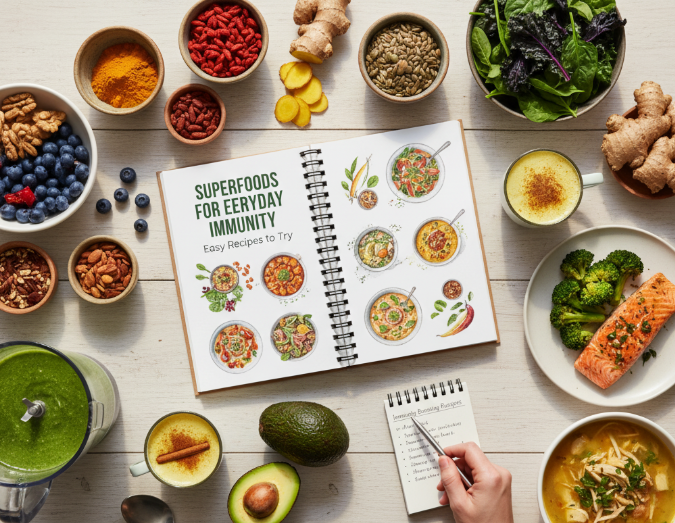
Ingredients:
- 2 salmon fillets
- 4 cloves garlic, minced
- 3 tablespoons butter
- 2 cups broccoli florets
- 1 red bell pepper, in chunks
- 1 cup cherry tomatoes
- 2 tablespoons olive oil
- 1 lemon
- Salt, pepper, and dried herbs
Instructions:
- Preheat oven to 425°F
- Mix vegetables with olive oil, salt, pepper and herbs on sheet pan
- Roast for 15 minutes
- In the meantime, melt butter in another pan and add garlic
- Place salmon, skin side down, in pan and cook 4 minutes.
- Turn and cook for further 3-4 minutes.
- Layer salmon onto roasted vegetables, sprinkle with lemon wedges.
Why it works: Salmon for vitamin D and omega-3s, broccoli for vitamin C and sulforaphane, garlic for immune-supporting allicin.
One-Pot Turmeric Chicken and Rice
A healthy dinner in which to minimize mess and maximize nutrients.
Ingredients:
- 4 chicken thighs
- 1½ cups brown rice
- 3 cups chicken broth
- 1 onion, diced
- 3 cloves garlic, minced
- 1 tablespoon turmeric
- 1 teaspoon ginger powder
- 2 cups spinach
- ½ cup raisins (optional)
- ¼ cup sliced almonds
Instructions:
- Season chicken with salt, pepper and half of turmeric.
- Brown chicken in a large pot, and remove.
- In the same pot, sauté onions and garlic.
- Stir in rice and the rest of turmeric, ginger, and broth
- Add chicken, cover and simmer for 40 minutes.
- Add spinach and raisins during final 5 minutes.
- Sprinkle toasted almonds on top and serve.
Why it works: The turmeric and ginger reduce inflammation, the chicken offers plenty of protein and zinc, and spinach is great for several vitamins.
Veggie-Packed Stir-Fry with Ginger Sauce
This fast dinner is ready in less than 20 minutes and makes use of whatever vegetables you have on hand.
Ingredients:
- 2 cups assorted vegetables (bell peppers, broccoli, snap peas, carrots)
- 8 oz tofu or chicken, cubed
- 3 cloves garlic, minced
- 2 tablespoons fresh ginger, grated
- 3 tablespoons soy sauce
- 1 tablespoon honey
- 1 tablespoon sesame oil
- 2 tablespoons vegetable oil
- Cooked rice or noodles
- Sesame seeds for garnish
Instructions:
- Combine soy sauce, honey, sesame oil and half the ginger and garlic
- Heat oil in the wok or large pan over high temperature
- Cook tofu or chicken until golden brown, then remove.
- Stir-fry vegetables for 3-4 minutes
- Return protein to pan, and stir in remaining ginger and the sauce
- Toss for 2 minutes.
- Serve over rice or noodles, sprinkle with sesame seeds
Why it works: This recipe contains a variety of immune-boosting vegetables, ginger is anti-inflammatory and garlic helps support white blood cell function.
Snacks and Sweet Treats to Boost Immunity
Dates and Almonds Energy Balls
These no-bake bites take the edge off cravings for something sweet and provide nutrients.
Ingredients:
- 1 cup pitted dates
- 1 cup raw almonds
- 2 tablespoons chia seeds
- 1 tablespoon honey
- 1 teaspoon vanilla extract
- Pinch of salt
- Shredded coconut for rolling
Instructions:
- In a food processor, pulse the almonds until they are coarsely ground.
- Mix in dates, chia seeds, honey, vanilla and salt
- Process until mixture sticks together
- Roll into 12-15 balls
- Roll in shredded coconut
- Keep refrigerated for up to 2 weeks
Why it works: Almonds contain vitamin E, while dates are a natural source of glucose and chia seeds offer omega-3 fatty acids.
Turmeric Golden Milk Latte
This hot drink is just what you need on a cold night, and it helps your immune system as you chill out.
Ingredients:
- 2 cups milk, any kind (dairy or plant-based)
- 1 teaspoon turmeric powder
- ½ teaspoon cinnamon
- ¼ teaspoon ginger powder
- Pinch of black pepper
- 1 tablespoon honey or maple syrup
- ½ teaspoon vanilla extract
Instructions:
- Heat milk in a small saucepan over medium heat.
- Whisk in turmeric, cinnamon, ginger and pepper.
- Simmer for 5 minutes, stirring occasionally.
- Take off heat and stir in honey and vanilla
- Pour into mugs and enjoy warm
Why it’s good for you: The curcumin in turmeric combats inflammation, black pepper helps your body absorb it and the soothing drink warms you up when you’re feeling under the weather.
Weekly Immune-Boosting Meal Plan
| Day | Breakfast | Lunch | Dinner | Snack |
|---|---|---|---|---|
| Monday | Berry Smoothie Bowl | Citrus Quinoa Salad | Garlic Butter Salmon | Energy Balls |
| Tuesday | Turmeric Oatmeal | Leftover Salmon | Chicken Soup | Golden Milk |
| Wednesday | Spinach Scramble | Sweet Potato Bowl | Leftover Soup | Fresh Berries |
| Thursday | Berry Smoothie Bowl | Leftover Bowl | Turmeric Chicken Rice | Energy Balls |
| Friday | Turmeric Oatmeal | Leftover Chicken Rice | Ginger Veggie Stir-Fry | Golden Milk |
| Saturday | Spinach Scramble | Chicken Soup (new batch) | Salmon with Veggies | Fresh Berries |
| Sunday | Your choice | Citrus Quinoa Salad | Sweet Potato Bowl | Energy Balls |
How to Get the Benefits of Superfoods
Don’t Overcook Your Vegetables
Many vitamins are destroyed by high heat and long cooking times. Instead of cooking all the nutrients out of vegetables by boiling them to death, steam or lightly sauté. You want to aim for vegetables that are tender-crisp, so the carrots and peppers still have something of a bite.
Combine Foods Strategically
Some nutrients work better together. Combine vitamin C-rich foods with iron-containing foods to increase the absorption of iron. Pair turmeric with black pepper for 2,000% higher curcumin bioavailability.
Eat the Rainbow
Fruits and vegetables with different colors have different antioxidants. Reach for red, orange, yellow, green, blue and purple foods throughout the week.
Prep in Batches
Spend Sunday making big batches of quinoa, rice or skillet-roasted vegetables. Having healthy components at the ready makes for easy combinations that result in nutritious meals on those hectic weeknights.
Stay Consistent
Your immune system thrives on regular, steady nutrition more than intermittent, healthy meals. Rather than one-off experiments, make these recipes part of your regular rotation.
Common Mistakes to Avoid
Despite their best intentions, people do things that harm their immune health:
Taking Too Many Supplements: Whole foods, not pills, are the best way to ensure that you get enough of these nutrients because their actions can be complex. Obtain most of your nutrients from food, not bottles.
Limiting Yourself to One Superfood: There’s no one food that does it all for your immune system. Variety is essential.
Being Too Impatient: Strong immunity is not built in days, but weeks or months of disciplined healthy eating.
Not Forgetting Sleep and Stress: Food counts, but those are equally important for immunity. Practice 7 to 9 hours of sleep and try stress management techniques.
Forgetting to Hydrate: Water supports your immune cells as they travel around with partially dissolved nutrients and carries them through the body, while washing out toxins. You should drink a minimum of 8 glasses per day.
Frequently Asked Questions
How soon will these superfoods make me immune?
Your body starts to use the nutrients in the food you consume within hours, but building your immune system with a healthy diet takes repeated nourishment over weeks or even months. You could see an increase in energy within a couple of days, but important immune changes generally take place 4-6 weeks into good nutrition.
Can I eat these superfoods if I am already sick?
Absolutely! These foods may help you to recover faster. Pay special attention to chicken soup, vitamin C-rich citrus fruits, ginger tea and garlic. Be well-hydrated, make sure you are eating right and get enough rest.
Do frozen berries work as well as fresh?
Yes! Frozen berries are picked and frozen at their ripeness peak (for nutrient levels). They are often cheaper than fresh berries, and no less nutritious. Keep a bag in the freezer for smoothies and oatmeal.
How much garlic do I have to eat for immune benefits?
Research shows that eating 1-2 cloves of fresh garlic daily can help support the immune response. When crushing or chopping garlic, you can make the healthy compounds more bioavailable by allowing it to sit for 10 minutes before cooking.
Can kids eat these recipes?
Yes! These recipes are family-friendly. You may wish to dial down strong flavors like garlic or ginger a bit for young children, but you can feed these whole foods to kids safely and healthfully. Acclimating children to a variety of healthful foods early leads to lifelong positive habits.
Should I buy organic superfoods?
Organic is a plus but not essential for immune benefits. If you’re on a tight budget, focus your organic shopping for the “Dirty Dozen” (those that test most highly in pesticide residues, including strawberries and spinach) and buy conventionally grown produce for the “Clean Fifteen” (like avocados and onions).
What if I have food allergies or restrictions?
These recipes are fairly adaptable. Dairy-free? Just swap in coconut yogurt and plant-based milk. Nut allergies? Use alternate seeds, such as sunflower or pumpkin seeds. Gluten-free? These recipes are comprised largely of naturally gluten-free whole foods. Always read labels carefully.
How long can I keep these precooked meals?
Most cooked recipes keep in airtight containers 3 to 4 days inside the refrigerator. The quinoa salad and soup are actually tastier after a day as flavors blend. Energy balls keep in the fridge for 2 weeks. Date food storage containers for freshness!
Can I eat for immunity while trying to lose weight?
Yes! These whole food recipes are perfectly balanced and satisfying. They have fewer calories in comparison to processed foods, but contain more nutrients and fiber, which means it fills you up. Prioritize health; healthy weight will often, but not always, follow in its wake.
What drinks are good for the immune system besides golden milk?
Green tea is rich in antioxidants (such as EGCG). Echinacea and elderberry teas have been used to keep the immune system functioning. Fresh carrot, beet, and celery juice is also high in absorbable nutrients. More than any other drink, plain water is the most important for immune health.
Your Journey to Stronger Immunity Begins Here
To help build a powerhouse immune system, you don’t need to invest in costly supplements, complicated recipes or a total diet overhaul. It begins with small shifts — tossing a few more colorful vegetables onto your plate, snacking on berries instead of chips, testing out one new superfood recipe each week.
The recipes above demonstrate that immune-boosting foods can be delicious, budget-friendly and simple to prepare. Whether you’re blending up a smoothie bowl for breakfast or simmering a cozy pot of chicken soup for dinner, every meal can be a chance to feed your body’s innate protections.
Start small. Choose two or three recipes from this article that sound good and make them this week. Then when you’re comfortable with them, add a couple more. Before you know it, eating for immunity will become more intuitive than a chore.
And remember that food is only a piece of the immunity puzzle. Pair these healthy dishes with a proper amount of sleep, consistent movement, stress-relieving activities and good hygiene to support the strongest immune system possible. When you give your body the tools it needs to do its work, it’s remarkably resilient.
The superfoods and recipes presented here aren’t magic bullets, but they are potent allies to better health. Whether you’re nibbling on a berry or crushing garlic into your pot of beans, or sipping golden milk — that’s an investment in your well-being, and it adds up over time.
So head to your kitchen, choose an ingredient or two and get cooking. Your immune system will appreciate it, one tasty meal at a time.


